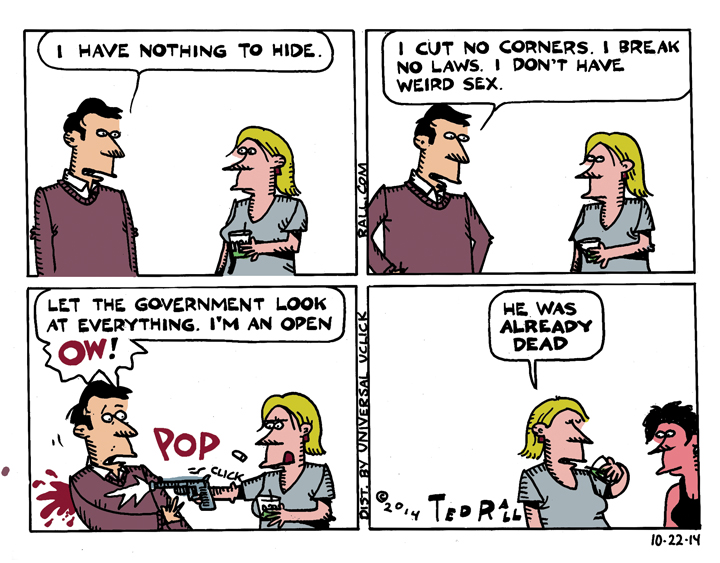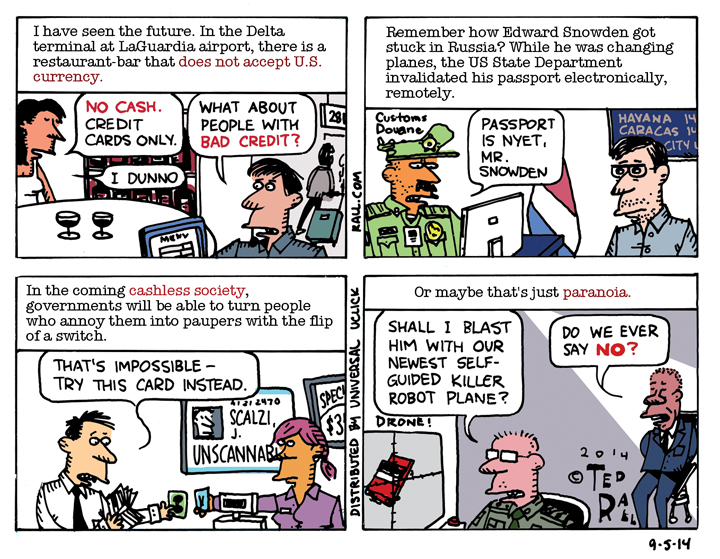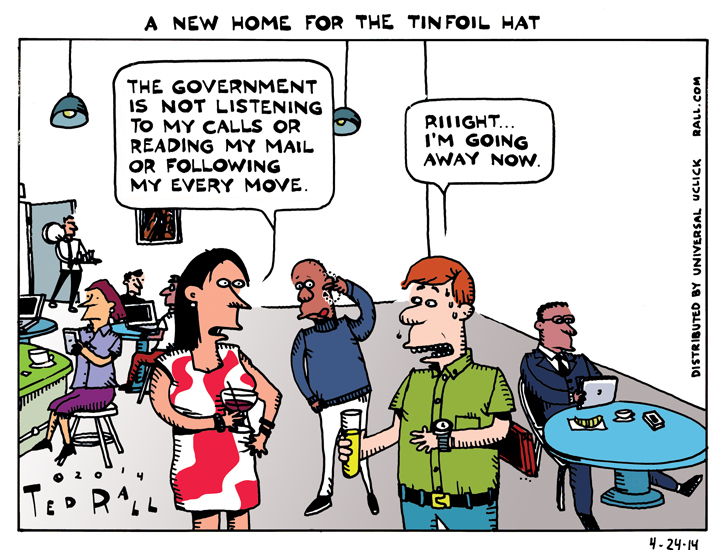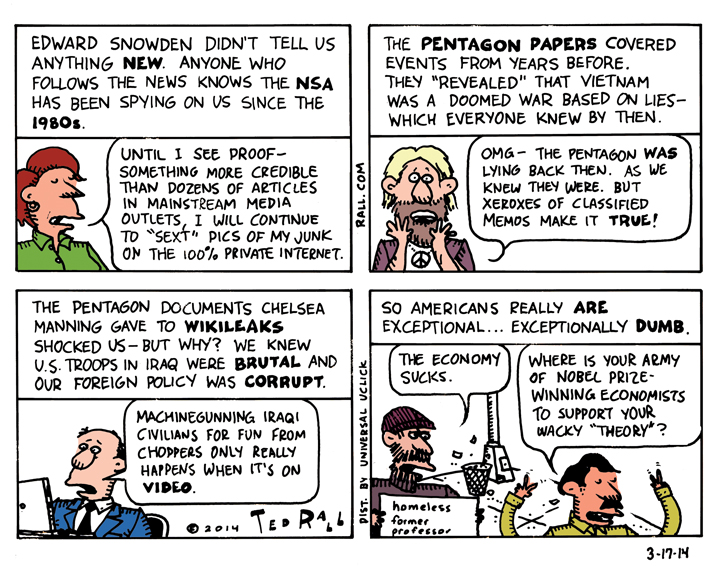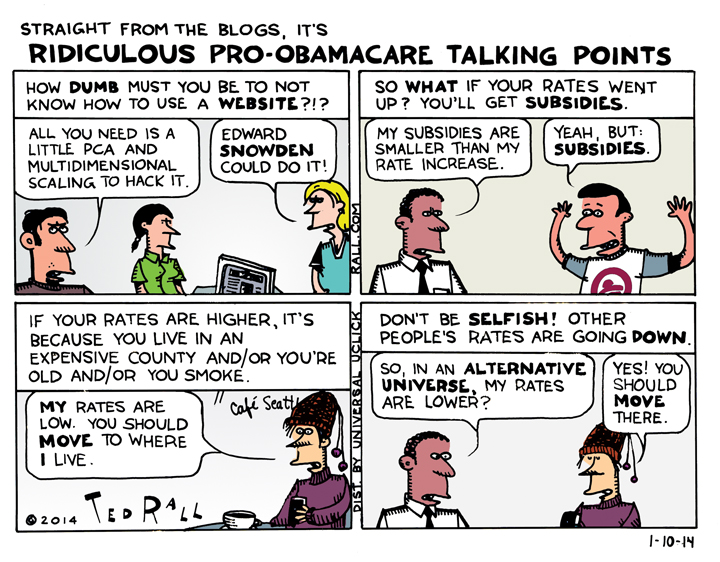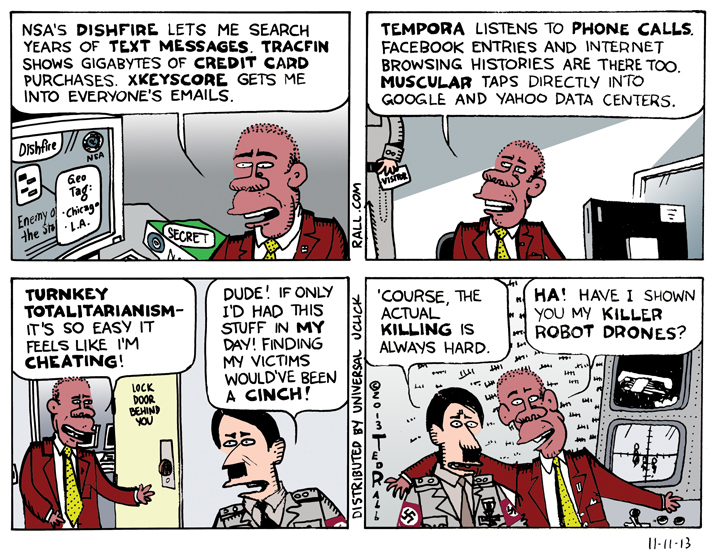Many people say there’s no reason to worry about the NSA’s surveillance because their lives are so boring that they have nothing to hide.
SYNDICATED COLUMN: Obama Starts Gulf War III — And His Pet Media Is Helping

They can’t help themselves.
Whatever the situation, the reaction of U.S. policymakers is more war.
Weak economy? War will get things going. Strong economy? Military spending will cool it off.
Two wars in the Middle East (Afghanistan and Iraq) finally winding down (because we’ve lost and people are sick of them)? Time to ramp up secret arms sales to a pair of pipsqueak insurgencies (Libya and Syria).
Other superpowers love militarism. But only the United States would send troops, rather than aid workers, to people devastated by natural disasters like tsunamis and earthquakes…even within the United States.
As Joel Andreas put it in his seminal graphic novel-format comic, American politicians are addicted to war. And we — even those who identify with the antiwar left — are like an addict’s long-suffering spouse, trapped in a dysfunctional relationship where we enable the militarism we claim to deplore.
The ruling elite’s addiction to militarism is fully visible in President Obama’s announcement that he plans to re-invade Iraq. He’s starting small, with a few hundred military advisers and maybe (i.e., probably) airstrikes via the precise, never-fails, cares-so-much-about civilians technology of drones. Sending a few hundred military advisers was, of course, how JFK initiated America’s involvement in the Vietnam War.
But we’ve already been through all that in Iraq. We invaded. We propped up a wildly unpopular pro-U.S. puppet regime. We fought. We lost — and lost big. We withdrew. Now our pet autocracy is collapsing. In Vietnam time, it’s 1975 in Iraq. This is supposed to be the part where we burn stacks of $100 bills, push Hueys into the sea, shove desperate locals off the roof of the embassy in Saigon/Baghdad and get out. Twenty or so years later, we come back and invade the right way — as obnoxious tourists and predatory sneaker company executives.
What’s up with Obama? Why is he treating Iraq like it’s Vietnam in 1962 — as though this were one of those hey, let’s just send a little help and see what happens affairs, as in there’s no way, no how “combat troops” (as opposed to non-combat troops) are going in (again), unless they do?
Even by presidential standards, Obama’s behavior is bizarre. Somewhere in the multiverse there must be one version of this story in which a half-dozen cabinet members, steeled in their resolve by the support of the Secret Service, rush into the Oval Office and bundle the President off to an institution that can give him the treatment he seems to require.
Alas, we live here.
In this weirdass country, the President’s re-invasion of Iraq is supported by 320 million enablers — not least of whom is the media.
It’s not just the sickening worship of all things soldierly, as when so-called journalists say “thank you for your service” to armchair generals who will never be on the wrong end of a shot fired in anger. The media drowns us in so much misinformation that it’s impossible for all but the most dedicated between-the-lines readers to come to an intelligent assessment of the facts.
Consider, for example, The New York Times. Given how often the paper has gotten burned by its pro-militarist establishmentarianism (supporting the failed right-wing coup attempt against Hugo Chávez in Venezuela, supporting the 2003 invasion of Iraq, not returning Edward Snowden’s phone call), you’d think its editors would be reluctant to support Gulf War III.
And yet.
A June 17th piece bearing the headline “Your Iraq Questions, Answered,” in which Times reporters reply to readers, is illustrative.
One reader asks: “ISIS [the Islamic State of Iraq and Syria, the Islamist insurgent militia threatening the U.S. puppet regime of Nouri al-Maliki, currently in control of half the country] seems to have legit online following. Is this reflective of support on the ground?”
Rod Nordland, Kabul bureau chief but reporting from Iraq, replies: “ISIS has a huge and very aggressive social media operation, but I don’t know how anyone could characterize that as a legitimate following. I suspect a lot of their followers, clicks and retweets are voyeuristic because the material posted is so bloody and savage, and ISIS is completely unapologetic about it. Hopefully, most of their following is aghast.”
So much for any smidge of journalistic objectivity.
Then things turn really stupid:
“Most people in the territory ISIS controls do not seem terribly supportive of them, but they hate the Shiite-dominated Iraqi government far more, and ISIS takes pains to treat the Sunnis in their dominions with consideration — at least at first. That is the central challenge that the Iraqi government faces, to convince people in ISIS-dominated areas that their government wants to include them, and has more to offer than the ISIS extremists.”
Anyone who has studied history or read Che Guevara — which you’d hope an employee of The New York Times might have done — knows that ISIS, as a guerilla army outgunned and outmanned by the central government it seeks to overthrow, would never have gotten as far as it has without substantial support among civilians.
Even more egregious than Nordland’s failure to convey this truism to Times readers is his closing combination of childlike naiveté and taking sides. Maliki has been in office for eight years. If he were interested in building a pluralistic post-sectarian political coalition, rather than ruthlessly excluding all but his own Shiites from positions of influence, he would have done so by now. Even with ISIS on the road toward Baghdad, he hasn’t shifted his Shiite-centric approach.
With the most respected news source in the United States spoon-feeding such nonsense, it’s no wonder we can’t break free of the militarist traps laid for Pentagon generals by defense contractors, for the President by his generals and for us by the President.
When’s the last time you read an uncompromising antiwar opinion on the op-ed page of a major newspaper? Have you ever seen someone completely against war interviewed on network television news — even on “liberal” MSNBC? Even the state radio for the intellectual elite, NPR, rarely grants airtime to experts who oppose militarism. I’m an addict — to news — and I can honestly say that it’s rare to see more than one antiwar talking head on TV in a year…and that’s on daytime shows with low viewership.
As long as the alternatives to war aren’t allowed a voice, our addiction to war is safe.
(Ted Rall, Staff Cartoonist and Writer for Pando Daily, is the author of the upcoming “After We Kill You, We Will Welcome You Back As Honored Guests: Unembedded in Afghanistan.” Subscribe to Ted Rall at Beacon.)
COPYRIGHT 2014 TED RALL, DISTRIBUTED BY CREATORS.COM
ANewDomain.Net Essay: NSA versus Tech Economy, Cost-Benefit Analysis
Silicon Valley worries that NSA spying is hurting American tech companies’ ability to compete internationally. Who wants to store their data here when they know it’s going to be spied upon? But the post-9/11 police state indirectly employs millions of Americans. What’s more valuable to the U.S. economy — the security surveillance sector, or IT? The answer may or may not surprise you…but it will bum you out:
But then I began thinking about the vast scale of the post-9/11 police state. Tens of thousands of employees. Hundreds of thousands of private contractors. Many of them, like former CIA contractor Snowden, paid six-figure salaries. That huge data farm in Utah. That’s a lot of economic activity. For the moment, let’s set aside the moral and political ramifications of law-breaking citizens (the NSA’s charter prohibits both intentional and accidental data collection in the United States) who spy on law-abiding citizens. As a simple matter of short-term cost-benefit analysis, what’s better for the American economy: privacy or police state?
This essay is exclusively at ANewDomain.net. Please check it out and spread the word.
SYNDICATED COLUMN: Coverage of the anti-NSA Protest is an Example of a New Way to Disseminate Government BS
Redirection to Water Down the Potency of Dissent
On Saturday, October 26th several thousand people gathered near the Capitol Building in Washington to protest National Security Agency spying against Americans. As juicy news, it didn’t amount to much: no violence, no surprises. Politically, it marked an unusual coalition between the civil liberties Left and the libertarian Right, as members of the Occupy Wall Street and Tea Party movements stood side by side. But that’s not how it was framed.
The way U.S. media outlets chose to cover the march provides a fascinating window into a form of censorship they often use but we rarely notice: redirection.
The message of the marchers was straightforward. According to the British wire service Reuters, the protesters carried signs that read “Stop Mass Spying,” “Thank you, Edward Snowden” and “Unplug Big Brother.”
USA Today reported another sign — “No NSA mass spying” — and that marchers chanted “no secret courts” and “Hey hey, ho ho, the NSA has got to go.”
The message of the marchers was unambiguous: they demanded that the NSA stop spying on Americans, or be shut down. If the signs and the slogans and the things marchers said weren’t clear — “this isn’t about right and left — it’s about right and wrong,” USA Today quoted Craig Aaron — the group that organized the event is called “Stop Watching Us.”
Not “Keep Watching Us, Albeit With Increased Congressional Oversight.”
Stop laughing. I know, I know, no one in the history of protest marches has ever called for half-measures. U.S. Partly Out of Vietnam! Somewhat Equal Rights for Women!
Yet that’s how the media covered the anti-NSA event.
First line of USA Today‘s piece: “Thousands rallied against NSA’s domestic and international surveillance on Saturday by marching to the Capitol and calling for closer scrutiny of the agency as more details of its spying are leaked.” [My italics, added for emphasis.]
Associated Press headline: “NSA spying threatens U.S. foreign policy; protesters demand investigation of mass surveillance.”
MSNBC: “‘Stop Watching Us’ sees a chance to reform the NSA”
It is true that “Stop Watching Us” sent a letter to Congress. But there’s no way for a fluent English speaker to interpret their statement as “calling for closer scrutiny” or “reforming” the NSA. “We are calling on Congress,” the group wrote, “to take immediate action to halt this surveillance and provide a full public accounting of the NSA’s and the FBI’s data collection programs.”
Unambiguous.
“Stop Watching Us” didn’t call for “reform.” Nor did the October 26th matchers. They called for the NSA to stop spying on Americans. Some of them called for the NSA to be closed.
No one called for less than a 100% end to domestic surveillance.
USA Today lied about the rally. So did the AP. As did MSNBC.
They did it by redirecting a radical, revolutionary impulse into a moderate, reformist tendency.
The U.S. is an authoritarian police state with democratic window-dressing. Stopping NSA spying on Americans would fundamentally change the system. There’s no way the government, or its mainstream media outlets, would voluntarily give up their info trolling. What they might do, however, is “pull this back,” as Al Gore said. “I think you will see a reining in.”
Categorizing strong political views of swaths of Americans as weaker, more moderate and watered down than they really are is a relatively new tactic for American media gatekeepers. Until recently, the standard tool of the U.S. censor when confronting dissent was to ignore it entirely (c.f., the 2003 protest marches against the invasion of Iraq and the long time it took for them to cover the Occupy movement of 2011). For activist groups and protesters, this might seem like an improvement. Which is what makes it pernicious.
Getting covered by the media isn’t always better than being ignored. If your radical politics get expressed in public as moderate reformism — and you tacitly acquiesce with this misrepresentation by your silent cooperation — you’re serving the interests of the system you oppose, making it appear open to reform and reasonable, and you less angry than you really are, though neither is true.
(Ted Rall’s website is tedrall.com. Go there to join the Ted Rall Subscription Service and receive all of Ted’s cartoons and columns by email.)
COPYRIGHT 2013 TED RALL

